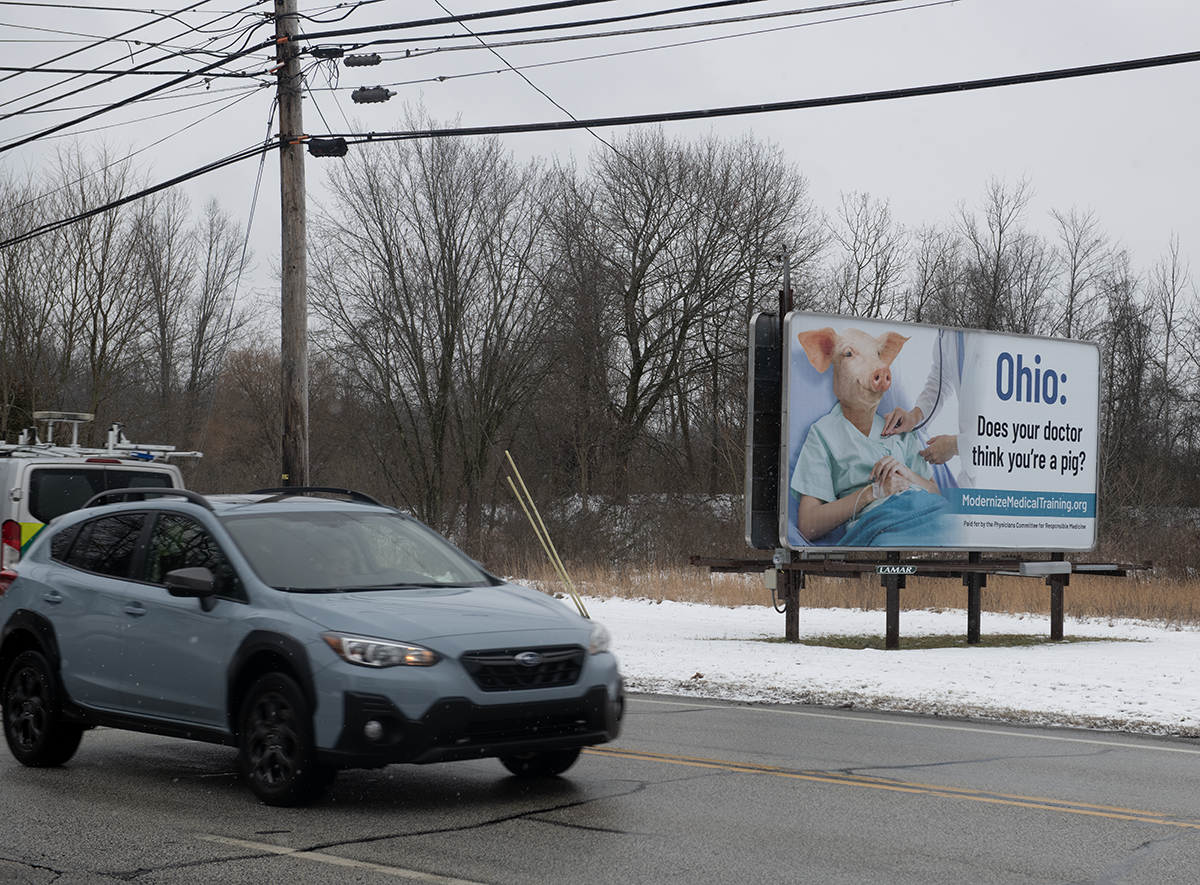'Does your doctor think you're a pig?' Physician group criticizes use of pigs at NEOMED

- Oops!Something went wrong.Please try again later.
A group of doctors has filed a complaint with the United States Department of Agriculture over the use of live pigs to train medical residents on surgical procedures at Northeast Ohio Medical University in Rootstown Township.
The national group, the Physicians Committee for Responsible Medicine, also has launched a public awareness campaign with billboards throughout the region.
"Ohio, does your doctor think you're a pig?" reads the billboard located off Prospect Street between Rootstown and Ravenna Township. An identical billboard is posted off East Exchange Street, near the University of Akron campus.
The billboard lists a website, ModernizeMedicalTraining.org, that states St. Elizabeth Hospital in Youngstown is one of 56 training programs nationwide using animals.
St. Elizabeth's residency program is affiliated with NEOMED.
Three other residency programs affiliated with NEOMED — Summa Health System, Cleveland Clinic Akron General and Western Reserve Hospital in Cuyahoga Falls — are listed among the 206 programs nationwide, and 13 programs in Ohio, that do not use animals in their training.
NEOMED spokesman Roderick Ingram said the university does not use live animal laboratories in its medicine or pharmacy curriculum.
Medical students are trained through a variety of alternate means, including working with cadavers and simulated patients, he said.
However, NEOMED does facilitate "a very limited number" of animal procedures for the residency program at St. Elizabeth Hospital in Youngstown. That hospital, he said, includes training for surgical residency students "who will conduct advanced surgical techniques on patients."
The program conducts the procedures on two pigs per week over the course of the six-week program at a lab located on the NEOMED campus, he said.
"Every animal used in the training receives humane, high-quality care, including the use of anesthesia with ongoing monitoring to prevent pain and distress in surgery," he said.
National group requests USDA investigation
However, the physicians group said 79% of the residency programs it surveyed do not use live animals for training.
“Most of the confirmations come directly from conversations with surgery residency faculty and coordinators," said Dr. John Pippin, director of academic affair for the physicians group. "These are reported in our files. Some others are determined from public records, but we always try to confirm the records directly with residency staff.”
The physicians committee filed a complaint with the USDA requesting that it investigate the use of animals in procedures. The group obtained a copy of NEOMED's animal use protocol through a public records request.
NEOMED's protocol states that the university is permitted to perform up to 29 procedures to train surgeons, including gallbladder and kidney removal, chest tube placement, spreading the ribs to allow access to the heart and tracheotomy, where an incision is made in the neck and a breathing tube is inserted.
The physician group's complaint "requests that the USDA investigate this matter and order corrective action and appropriate penalties."
Better alternatives?
The physicians committee states in its complaint that laws regarding the use of animals, such as the Animal Welfare Act, require that the "principal investigator" — including course instructors — consider alternatives to procedures using animals for research or educational purposes.
The group alleges NEOMED didn't meet this standard because alternatives exist.
"Over the last three decades, advances in technology have made simulation the current gold standard for the training of physicians," the complaint states. "All surgery skills, including both open and laparoscopic procedures, can be taught using human-based methods, such as human-patient simulators, laparoscopic simulators, virtual reality simulators, human cadavers, and partial task trainers."
Ingram said although the USDA gives permission for up to 29 procedures to be conducted at NEOMED's animal lab, only a fraction of that number are actually performed.
"If ever an alternative exists, we pursue that alternative," he said "We always go by the standard of what is best to advance health."
This article originally appeared on Record-Courier: Physician group takes issue with pig procedures at NEOMED

